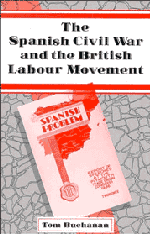Book contents
- Frontmatter
- Contents
- Preface
- List of abbreviations
- Introduction: ‘The Spanish problem’
- 1 ‘The best that could be done at the time…’: Non-Intervention, 17 July–28 October 1936
- 2 Breaking with Non-Intervention: October 1936–October 1937
- 3 The failure of the left: October 1937–April 1939
- 4 ‘A demonstration of solidarity and sympathy…': The Spanish Workers' Fund and its competitors
- 5 Opposition: Catholic workers and the Spanish Civil War
- 6 Rank-and-file initiatives
- Aftermath and conclusion
- Bibliography
- Index
5 - Opposition: Catholic workers and the Spanish Civil War
Published online by Cambridge University Press: 05 January 2012
- Frontmatter
- Contents
- Preface
- List of abbreviations
- Introduction: ‘The Spanish problem’
- 1 ‘The best that could be done at the time…’: Non-Intervention, 17 July–28 October 1936
- 2 Breaking with Non-Intervention: October 1936–October 1937
- 3 The failure of the left: October 1937–April 1939
- 4 ‘A demonstration of solidarity and sympathy…': The Spanish Workers' Fund and its competitors
- 5 Opposition: Catholic workers and the Spanish Civil War
- 6 Rank-and-file initiatives
- Aftermath and conclusion
- Bibliography
- Index
Summary
If the response of the labour movement to the Spanish Civil War is best explained by its defensive reactions and structures, which placed a greater emphasis on protecting the integrity of its institutions than on mounting a political campaign on behalf of its Spanish comrades, the strength of this imperative was bound to be reinforced by tangible evidence that the unity of the labour movement was endangered by the impact of the Civil War. The best example of a restraining factor of this kind was the effect of the response of Catholic workers upon labour's leaders. The atrocities perpetrated against the Spanish church, mainly by anarchists, in the first months of the conflict left many working-class British Catholics either neutral or thoroughly hostile towards the Spanish Republic and made them question whether the labour movement was truly representing their interests in this matter. This chapter charts the nature, extent and ramifications of such disaffection within the labour movement.
The phenomenon of Catholic workers' opposition has been widely recognised but has received a varied historical treatment for two main reasons. Firstly, the identification of Franco's cause with fascism has been a major obstacle to a proper understanding because it has made Catholic ambivalence towards the Spanish Republic and, in some cases, support for Franco appear aberrant and shameful. Hence historians, especially on the left, have been tempted to ascribe Catholic workers' reactions purely to the power of the pulpit – portraying them as either bullied or indoctrinated into abandoning their duty towards their comrades in Spain.
- Type
- Chapter
- Information
- The Spanish Civil War and the British Labour Movement , pp. 167 - 195Publisher: Cambridge University PressPrint publication year: 1991



